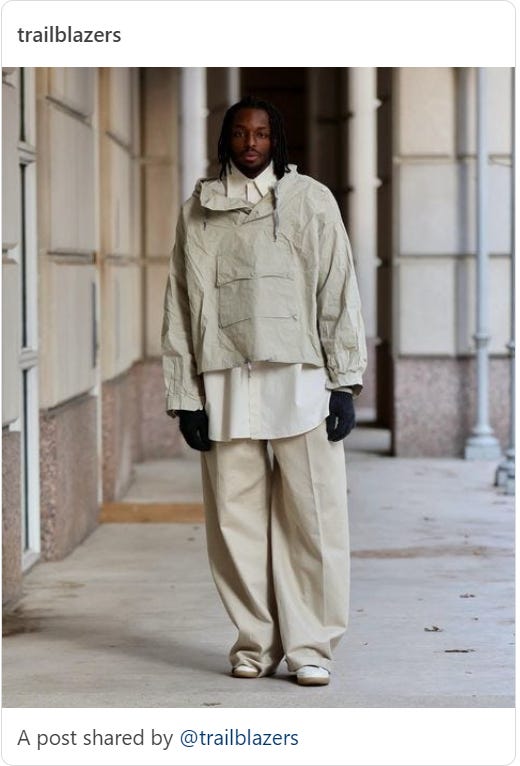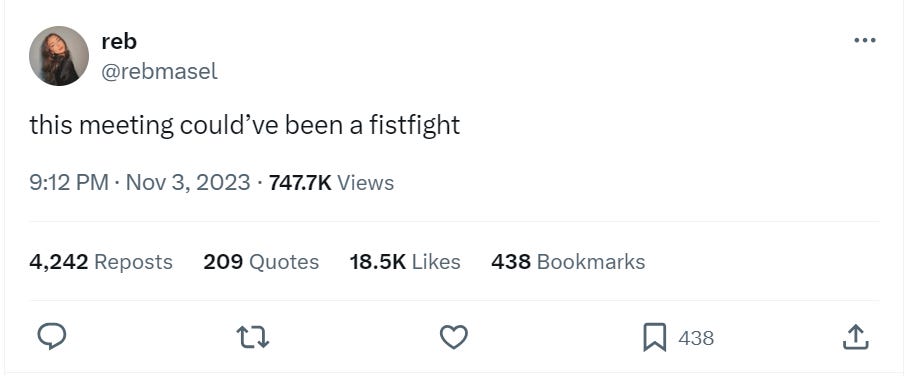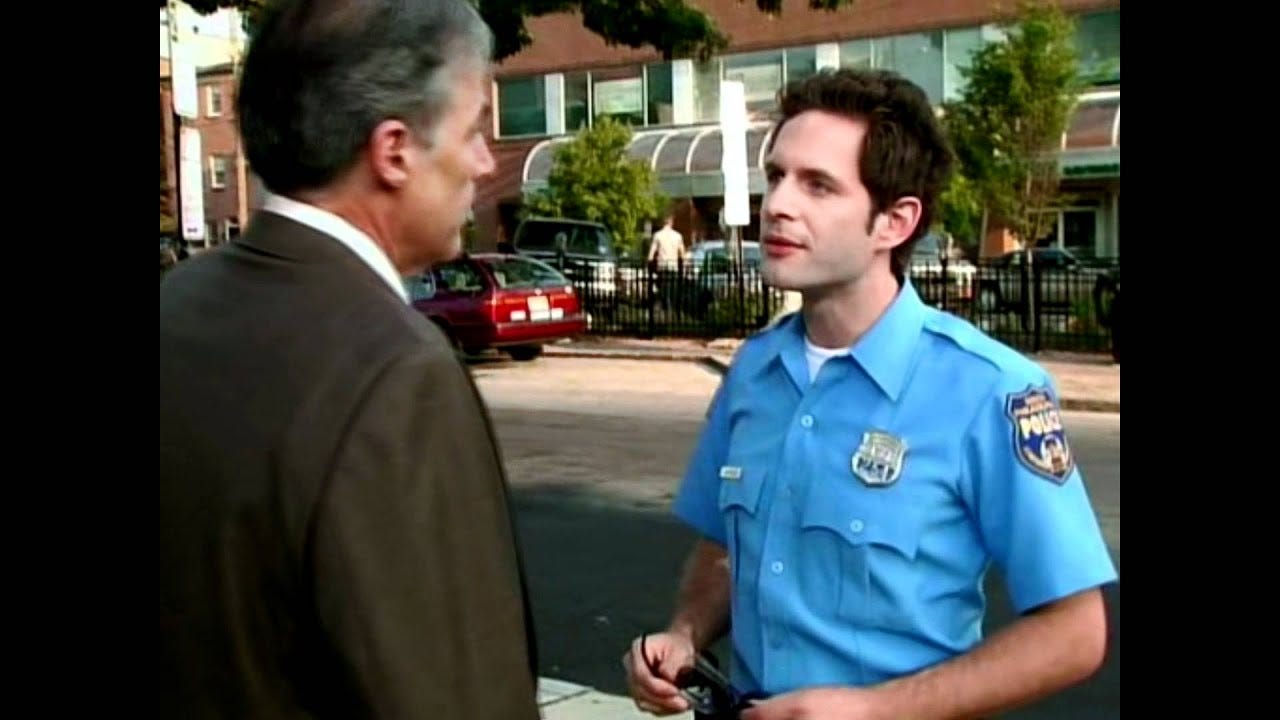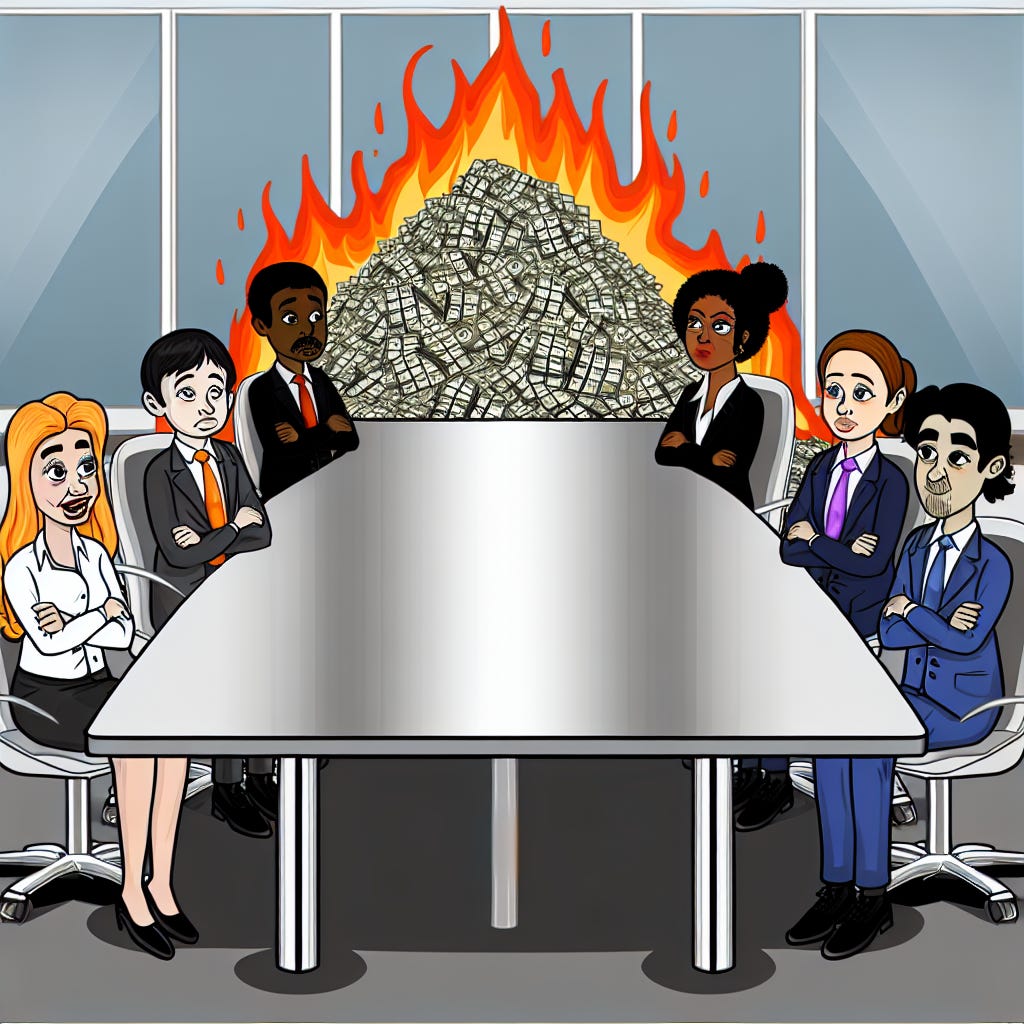Meetings Are the Worst
We have too many meetings and we run them poorly.
Every week I fall into the trap of “I just need to get through the next week and things will calm down.” Two kids under five and a demanding middle-manager job at a large ad agency make this self-talk a lie, week after week. I find myself managing a calendar increasingly chaotic - distributed teams lead to a range of time zones, which shorten windows of availability, which makes scheduling meetings very difficult. And that’s before we even get the client or vendor availabilities.
I have a no Friday meetings rule. This rule holds up about as well as paper straws. Meetings get bumped for other meetings. That super important meeting only has key stakeholder avails (I loathe that word, almost as much as “deets”) on Friday and you have to get aligned this week. Monday was a holiday so everything gets shifted a bit. In other words, meetings are running the show and if it’s anything like the way we run meetings, they are doing a terrible job.
Maybe Just Leave Me Alone?
I think we all reach the point during the week (or maybe even during the day) when we’d love to channel Logan Roy and tell everyone simply to fuck off. The constant shuffle from meeting to meeting, trying to stay on top of email (good luck if you actually want to pay attention at work), the day ending up nothing like your schedule dictated on the commute in - it’s like NBA tunnel walks to the locker room with everyone wanting to be a fashion icon today: a bit much.
As much as we’d like to work in a silo, that’s simply not how corporations work today. Sure, there’s the IC route, but you still have to attend some meetings and maintain good rapport with the people signing your checks. They’re a necessary evil, we’ve just made them more evil than they need to be.
Run Good Meetings
In a classic (dated 1976) on meetings in HBR, author Antony Jay has some key opening lines about meetings themselves. “A great many important matters are quite satisfactorily conducted by a single individual who consults nobody,” and “many long-established committees are little more than memorials to dead problems.” Ouch. But Jay cedes that meetings are necessary, we just need to run them better.
So how do we do that?
Have an actual goal. Before you add attendees, find a time to gather everyone, and (if you’re lucky) get a conference room, ask yourself what the purpose of the meeting you want to call is. Can it be an email? A quick Teams chat? A (gasp) phone call?
Be prescriptive about your invite list. More than 12 and you’re likely already outside of the zone of productivity - the ideal meeting meant to actually accomplish something should have four to seven people in it. Think about the value each individual will contribute to the discussion - if that’s unclear, brief them via email after the fact.
Make an agenda. Make sure each point has a little context around it and not just a vague thing about “budget” or “activation.” Also, it helps to group agenda items into buckets - something like “For information,” “For discussion,” and “For decision.” Keep the meeting running on the guard rails the agenda provides and use it to play time cop where necessary. Move stuff to the parking lot if you’re getting off track - don’t let it turn into a free-for-all.
Take notes and send them out afterward. Make sure there are clear, actionable next steps coming out of the meeting assigned to people (otherwise, what was the point?) On top of this, anything agreed to during the meeting (or, conversely, that was still a point of contention) needs to be called out to keep everyone accountable and aligned.
Two other small tips for meetings I’ve found quite helpful: leave the laptop at your desk and take notes the old-fashioned way with pen and paper. The laptop is distracting and studies show that being a Luddite when it comes to taking notes helps you retain complex concepts and facts - important stuff in today’s “ambiguous” business world.
Don’t Overdo It
Great - so now you’re running wildly effective meetings and you’re not wasting people’s time by inviting them, so time to do it up, right? Wrong.
Regardless of their efficacy, we simply have too many meetings today at work. Studies have found too many meetings sap productivity and employee morale. When meeting volume goes down at companies, job satisfaction and productivity go up.
The negative correlation between meetings and productivity is obvious and borne out in the numbers - rarely does management advice have data this clear behind it.
Seriously, Just Leave People Alone
In 1665 Britain closed down schools and sent people home to quarantine to avoid the bubonic plague going around. A relatively unimpressive student from Cambridge went home and stayed in for two years, during which he made great strides in his studies of calculus, light theory, and the laws of gravity. Isaac Newton probably was bogged down by too many meetings as a student on the River Cam.
When he was finally left alone to do deep work he blossomed and created a form of math that saw me achieve my worst grade in college (I was out of pass/fails.) This kind of focus is what drives innovation and the kind of work our executives want us to be doing, but meetings continually get in the way.
One freelancer in a recent WSJ article had to remind his superiors how much they were paying him per hour in order to get out of useless meetings. In client services, this is something both client and agency should be pushing for. Agencies for better internal processes and productivity and clients because they’re paying ungodly amounts of hourly time for people to sit in meeting after meeting where the returns tend to be so minimal there’s no point in trying to figure out where they’re diminishing.
Next time you’re in a meeting, take note of the participants and do some mental calculations of how much the meeting is costing per hour. This is very easy in client services where we all have specific rates based on title hanging above our heads as we roam the halls. For salaried folks not in the “profit” column on the P&L, there are calculators that can help determine how much a meeting is costing. Once you have the dollar amount, think about the value derived from that particular meeting (or set of meetings for the dreaded ongoing status) - is there a gap between them? There very likely is.
Unlike Isaac Newton, we have Zoom and Teams and Slack, so even another global pandemic won’t give us the breathing room to get our work done. We’ll need to proactively do it ourselves.
Grab Bag Sections
WTF AT&T: Last week, some AT&T customers were locked out of one of their most prized and precious possessions: their mobile phones. Everything worked on the phone except the carrier services, so WiFi and all of the apps were fine - you just couldn’t make non-WiFi enabled calls or do SMS for a couple of hours one day last week. Annoying and inconvenient, but for consumers it wasn’t really a huge deal when you think about the fact that part of First Net runs on AT&T and was affected.
Because of the outage, AT&T is reaching deep into its own pockets and offering up the incredible sum of $5 to those most affected. Some people are praising this, but this newsletter sees it differently. They’ll lose millions in revenue as they offer a paltry sum to people who couldn't communicate on the go for half a day (given the ubiquity of WiFi in many areas the outage was not nearly as disruptive as it could have been on the consumer side.)
Some people were more affected than others, and they should be reimbursed well beyond a fiver for the issues. But by just tossing people the cost of a cup of coffee regardless of actual harm, they piss off those who were actually inconvenienced while offering something that will buy them zero brand goodwill with those who were not. Good thought, bad execution.
Album of the Week: The proprietor of a tri-state area record store once told me anything Adele made after 19 was “commercial trash.” I don’t agree, but Adele’s debut is overwhelmingly deserving of AOTW status.
Adele continues the tradition of blue-eyed soul, adding to the Great Britain roster that contemporaries Amy Winehouse and Duffy were on in the 2000s. “Chasing Pavements” is the single that got me hooked on Adele, even if her cover of Bob Dylan’s “Make You Feel Me Love” is sung in such a way that it gets into your bones when you listen to it. You can’t really go wrong with most of the songs here, but listen out for the chorus in “Melt My Heart to Stone.” Incredible stuff.
Quote of the Week: “The time you enjoy wasting is not wasted time.” – Bertrand Russell
See you next week!








So. Many. Meetings.